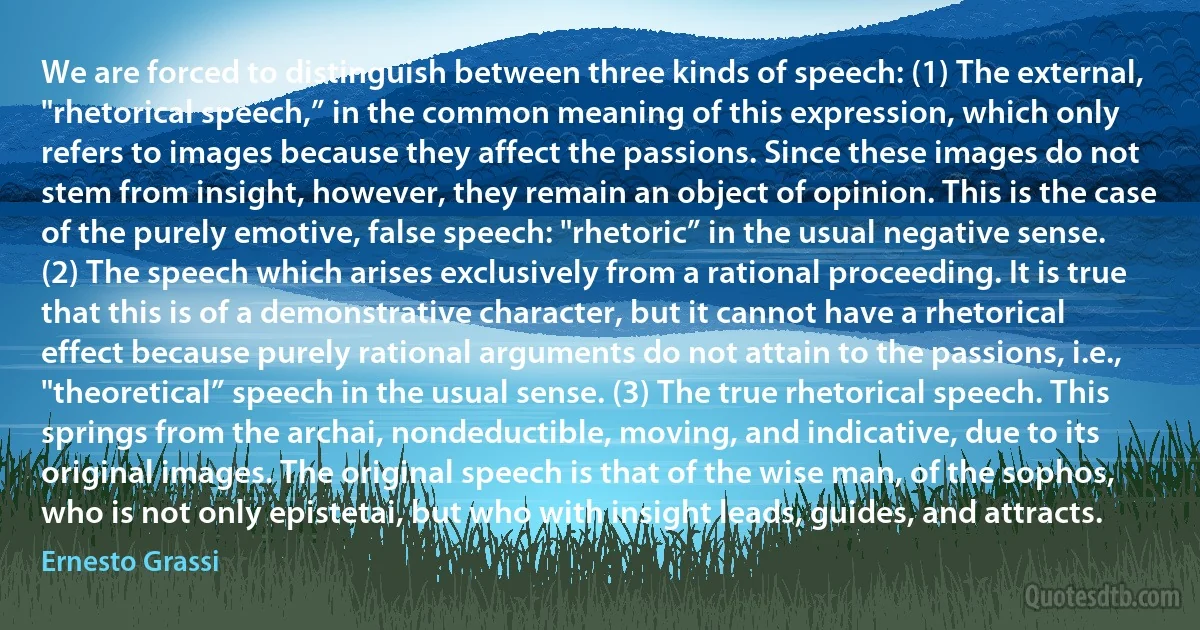
We are forced to distinguish between three kinds of speech: (1) The external, "rhetorical speech,” in the common meaning of this expression, which only refers to images because they affect the passions. Since these images do not stem from insight, however, they remain an object of opinion. This is the case of the purely emotive, false speech: "rhetoric” in the usual negative sense. (2) The speech which arises exclusively from a rational proceeding. It is true that this is of a demonstrative character, but it cannot have a rhetorical effect because purely rational arguments do not attain to the passions, i.e., "theoretical” speech in the usual sense. (3) The true rhetorical speech. This springs from the archai, nondeductible, moving, and indicative, due to its original images. The original speech is that of the wise man, of the sophos, who is not only epistetai, but who with insight leads, guides, and attracts.
Ernesto GrassiRelated topics
case character common demonstrative due emotive false indicative man meaning moving opinion proceeding remain rhetoric rhetorical sense speech three wiseRelated quotes
While I was pursuing the concept of geometrical product, as this idea was established by my father... I concluded that not only rectangles, but also parallelograms, may be viewed as products of two adjacent sides, provided that the sides are viewed not merely as lengths, but rather as directed magnitudes. When I joined this concept of geometrical product with the previously established idea of geometrical sum the most striking harmony resulted. Thus when I multiplied the sum of two vectors by a third coplaner vector, the result coincided (and must always coincide) with the result obtained by multiplying separately each of the two original vectors by the third... and adding together (with due attention to positive and negative values) the two products. [Thus A(B + C) = AB + AC. ]
From this harmony I came to see a whole new area of analysis was opening up which could lead to important results.

Hermann Grassmann
I also knew the formula that expresses the energy distribution in the normal spectrum. A theoretical interpretation therefore had to be found at any cost, no matter how high. It was clear to me that classical physics could offer no solution to this problem, and would have meant that all energy would eventually transfer from matter to radiation. ...This approach was opened to me by maintaining the two laws of thermodynamics. The two laws, it seems to me, must be upheld under all circumstances. For the rest, I was ready to sacrifice every one of my previous convictions about physical laws. ...[One] finds that the continuous loss of energy into radiation can be prevented by assuming that energy is forced at the outset to remain together in certain quanta. This was purely a formal assumption and I really did not give it much thought except that no matter what the cost, I must bring about a positive result.

Max Planck
At the point at which the concept of différance, and the chain attached to it, intervenes, all the conceptual oppositions of metaphysics (signifier/signified; sensible/intelligible; writing/speech; passivity/activity; etc.)- to the extent that they ultimately refer to the presence of something present (for example, in the form of the identity of the subject who is present for all his operations, present beneath every accident or event, self-present in its "living speech," in its enunciations, in the present objects and acts of its language, etc.)- become non pertinent. They all amount, at one moment or another, to a subordination of the movement of différance in favor of the presence of a value or a meaning supposedly antecedent to différance, more original than it, exceeding and governing it in the last analysis. This is still the presence of what we called above the "transcendental signified.

Jacques Derrida
In his references to my own work, Gould includes at least nine citations that involve more than just an expression of Gould's opinion; in these citations Gould purportedly paraphrases my views. Yet in eight of the nine cases, Gould's representation of these views is false, misleading, or grossly caricatured. Nonspecialists could have no way of knowing any of this without reading the cited sources. While an author can occasionally make an inadvertent mistake in paraphrasing another, it appears Gould's paraphrases are consistently slanted to serve his own message...
Of all the book's references, a full 27 percent precede 1900. Another 44 percent fall between 1900 and 1950 (60 percent of those are before 1925); and only 29 percent are more recent than 1950. From the total literature spanning more than a century, the few "bad apples" have been hand-picked most aptly to serve Gould's purpose.

Arthur Jensen
They are confronted in Ireland with a situation which is largely due to their own lack of insight and of sympathy, confronted with a situation which needed strong and firm handling, strong and firm, but at the same time and above all, just, even-handed, and dispassionate. They have let loose this orgy of reprisals which confuse the innocent and the guilty in a common tumult of lawless violence. They deny, they prevaricate, they cloak and screen and block the avenues to truth in a childish belief that when order has been restored, a cowed and subjugated people will spread out grateful hands to grasp the boon of pinchbeck Home Rule. I say deliberately that never in the lifetime of the oldest among us has Great Britain sunk so low in the moral scale of nations. That, at any rate, when most of the members of the Coalition are forgotten, will be an achievement which will be remembered in history.

H. H. Asquith
